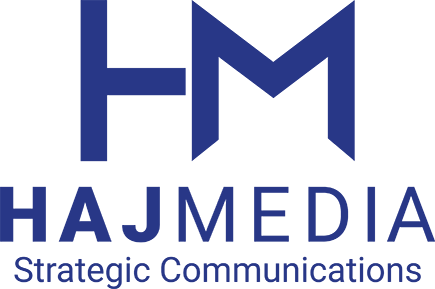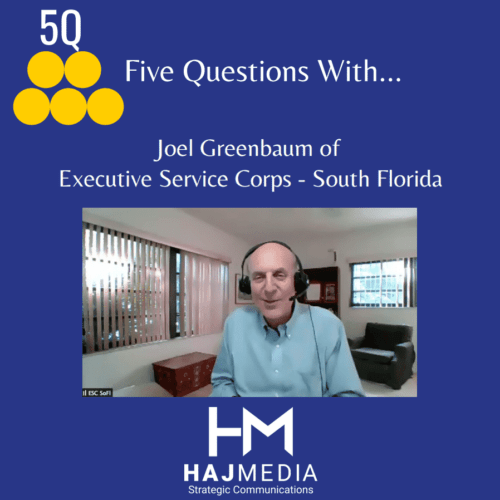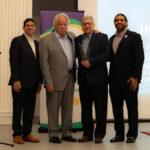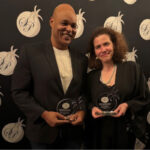Five Questions (5Q) With…
Joel Greenbaum took the skills he learned as a New York City musician, the influence of stars who belted out songs from his recording studio, and a deep social conscience to develop and devote his life to nonprofit work. He is currently the President and Chief Executive Officer of Executive Service Corps – South Florida.
1. Tell us a little bit about your background and how you came to Executive Service Corps – South Florida (ESC-SoFL)?
I started my career after college as a professional musician. I was a pianist, composer and arranger, and received a National Endowment for the Arts grant to compose a jazz trio and orchestra piece. While this may seem unrelated to the rest of my career, it’s central to the early skills I developed as a composer and improvising jazz musician – having a vision for an orchestral piece, then figuring out how to tell the story from start to finish.
Not wanting to spend life on the road as a traveling musician, I took out a loan and used the money to design and build a recording studio in New York City. A few of my clients included Yoko Ono, Harry Belafonte, Herbie Hancock, the Red Hot Chili Peppers, Hugh Masekela and many other well-known recording artists. During this time, I began to pursue a passion for helping causes I believed in by volunteering with nonprofit organizations. After 12 years, I decided it was time to reconcile my social conscience with my work skills – I sold the business and started working in the public sector running nonprofit organizations. This wasn’t an easy transition – nonprofits didn’t understand that the skills I had were transferable, but, eventually, an organization took a chance on me.
2. How did you come to your current role, and can you describe what attracted you to ESC-SoFL?
In 1998, I moved to Fort Lauderdale with my family to serve as the Executive Director of Leadership Broward Foundation. I left after a few years to start another business, which I operated for 16 years before selling it. I became concerned about what was (and wasn’t) happening in our community (and in our country) and decided I would regret not rolling up my sleeves again to see what I could do to make a difference. I oversaw several federal disaster relief grants in Broward County after Hurricanes Irma and Maria. I then learned about an opportunity with Executive Service Corps – South Florida (although at the time, it was still called NESC: National Executive Service Corps of South Florida). I was very excited about the organization’s mission.
Simply put, Executive Service Corps – South Florida is dedicated to contributing the extensive management expertise of volunteer consultants to help resource-constrained nonprofits in South Florida. We do this by deploying retired and semi-retired C-Suite executives as consultants to help area nonprofits with capacity building-type projects, like strategic planning, executive coaching, training, executive searches, and a host of other services. Our consultants take a team approach, and we never assign them as interim or temporary replacement staff that might displace a nonprofit’s paid employees.
3. Your organization relies entirely on volunteers. Can you tell us the qualities you look for when you bring volunteers aboard?
We’re looking for people from both the private and public sectors who have C-Suite experience and possess various skillsets and backgrounds. To meet the variety and scope of the projects we undertake on behalf of the nonprofits we serve, it helps to have a diverse roster. And, by a diverse roster, I’m not just including skillsets, but racial, ethnic, gender and socio-economic backgrounds, too. While not necessarily a deal-breaker, if a volunteer’s experience is primarily corporate, it also helps if they’ve volunteered with a nonprofit before (board member or any other volunteer experience). While nonprofits are businesses, the culture of NPOs is different from that of Corporate America, and it’s important our senior consultants are sensitive to the differences.
4. As you mentioned, your volunteers are often retired executives and professionals, which is different from what one might think of a “typical” nonprofit volunteer. Can you share how the national organization came to target this select audience?
NESC was first established to aid businesses internationally (it still does through a separate organization). Founders Frank Pace, Jr. and David Rockefeller soon recognized the same need for the nonprofits right here in our country who were increasingly providing services to underserved constituents and filling in gaps left by federal, state and local governments. I believe NESC’s co-founders, coming out of government and the corporate and philanthropic worlds, had the vision to establish early standards for what we now refer to as corporate responsibility.
5. Almost everyone has been impacted by the pandemic, particularly those in the nonprofit world. How has your organization fared, and are you looking at things a bit differently these days?
We were fortunate in this regard because ESC-SoFL was already a virtual organization. We don’t maintain a physical office, and we were already using cloud-based technology to run our organization, and using virtual meeting platforms to conduct many of our meetings. Of course, we had no idea how the pandemic would impact the nonprofits we serve and our services as a result.
Early on in the pandemic, we conducted a brainstorming session with our consultants to look at how we could best serve the community. One of the projects that came out of this session was assisting the Pride Center at Equality Park of South Florida in creating their COVID-19 Re-Opening Plan. Many other nonprofits began reaching out to us for help in the wake of the pandemic, and we wound up being busier than ever. When you think about it, this makes sense – offering high-level “corporate know-how” to local nonprofits has proved to be essential as they learn to adapt and pivot during these challenging times.
Bonus question: Is there anything you would like to share about ESC-SoFL and how other nonprofits can learn more about services that may help them?
Our website https://esc-sofl.org contains general information about our senior consultants and the many services we offer. Nonprofits can contact us through our website, and we’re happy to meet with them (virtually, of course) to explore ways that we can help. We also welcome volunteers to reach out to us through our website or social media channels. And, of course, there are the tried-and-true methods to reach us: Phone: 954-406-8549 and Email: [email protected].





